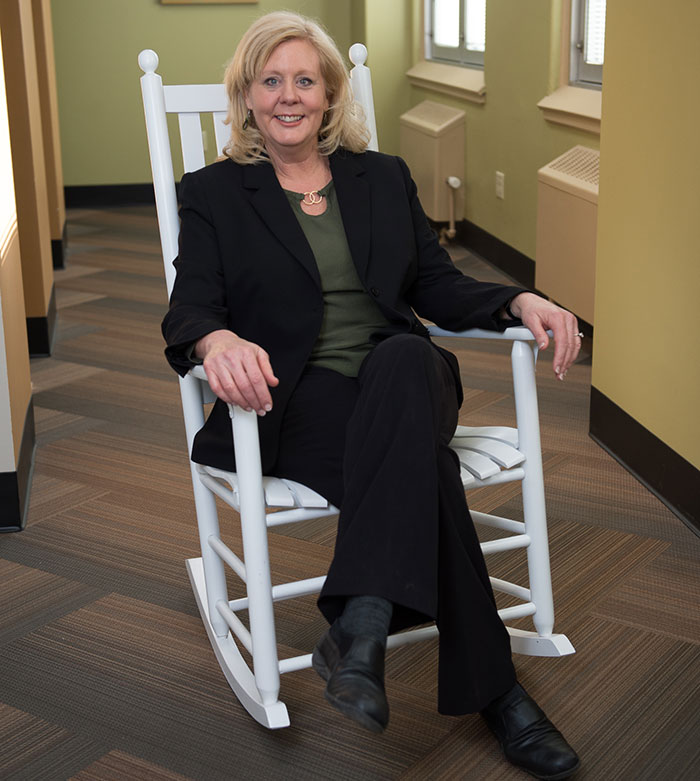Office of Research & Development |
 |


Dr. Rene' Cross, who served in the Air Force and Naval Reserve and is today a nurse practitioner at the Louisville VA, led a study on the benefits of rocking chair therapy for Veterans struggling with homelessness and substance abuse. (Photo by Thomas Downs)
February 8, 2018
By Mike Richman
VA Research Communications
"The chair helped me control my thinking and emotions."
Who says therapy has to be complicated?
Perhaps an effective tool for treatment and recovery could be something as simple as, say … a rocking chair.
Just ask a Marine Veteran who participated in a rocking chair study through the Robley Rex VA Medical Center in Louisville, Kentucky. At the time, he was in recovery from a serious addiction to alcohol and drugs, including recreational and pain-killing substances. “If it was a pill, I was popping it,” he says.
Plus, he had been homeless for about a year, “bouncing around from home to home, couch to couch,” as he put it.

Self-reliance may affect acceptance of mental health treatment in Veterans

Photos shed light on food insecurity in post 9/11 Veterans
The former Marine, now in his 30s, has since resurrected his life, in part because of a rocking chair. He credits his use of the chair with helping him control his urge to drink and consume drugs. During the course of the study, he’d spend at least a half hour rocking back and forth several times a day. He rocked mostly in a dark, quiet room.
He’s been free of drugs and alcohol for 15 months and is no longer homeless.
“The chair helped me control my thinking and emotions,” he says. “I’d be able to set my mind free and do away with addictive urges. It helped me to train myself that when I do get those thoughts, I can just meditate and let those problems go.”
“I’ve always been athletic,” he adds. “So the chair kind of reminded me a little that whenever I get on the field or on the court, all my troubles go away. I’m focused on one thing at a time. That’s what the rocking chair did for me.”
The former Marine was one of 19 Veterans who took part in the Louisville VA study, which was designed to test the therapeutic benefit of rocking chairs on homeless Vets in treatment for substance abuse problems, mainly alcohol addiction. Researchers hypothesized that if the participants could control mood and substance cravings, their likelihood of remaining in the treatment facility would increase, thus reducing their risk of chronic homelessness.
Researchers at the Louisville VA and at the University of Alabama collaborated on the study, which was published in the Journal of the American Psychiatric Nurses Association in December 2017.
The researchers concluded that “vestibular stimulation by rocking in a rocking chair may increase the ability to self-regulate mood and substance cravings, thereby potentially reducing risk of relapse and recurrent chronic homelessness.” The vestibular system is an area of the brain associated with mood and emotion.
Dr. Rene’ Cross, a nurse practitioner at the Louisville VA, served as the lead researcher.
“Veterans described the rocking as calming their racing thoughts, giving them peace of mind, relieving stress, relaxing, helping them stay focused, decreasing depression,” Cross says. “When a person finds themselves thinking of their substance of addiction cravings, it can lead to relapse. Being able to self-soothe by rocking in a rocking chair assisted in reducing those thoughts and thus temptations to relapse.”
Cross, an Air Force Veteran and a former Navy reservist, conceived of the idea for the pilot study. She serves former service members through the Health Care for Homeless Veterans program at the Louisville VA., and has seen some of them relapse on alcohol or drugs after coming through the program.
“When some of these Veterans circled back through my office, I asked them what they felt contributed to their relapse,” she says. “I nearly always got an answer that cravings for their substances made it difficult for them to calm down. This made them feel anxious, and they left the facility to go drink alcohol or use drugs.”
Cross read a study about people who experienced improvements in mood by using a rocking chair in a long-term care facility. She learned through other published work that the motion of rocking or swinging affects the vestibular system.
But none of those studies involved Veterans. So she became curious if a rocking chair may also help homeless Veterans who are battling addiction.
A large percentage of homeless Veterans abuse alcohol and drugs, and many former service members have psychiatric problems. Substance abuse is known to contribute to chronic Veteran homelessness.
In the pilot study, the participants had to have alcohol as one of their drugs of choice and to have voluntarily entered a substance abuse treatment clinic. They could not have motion sickness or a cerebellar disease, as well as a motor neuron disease that would prevent them from getting in and out of a rocking chair.
The Vets had access to rocking chairs at a non-VA transitional housing facility in Louisville that provides beds for homeless male Veterans.
A North Carolina-based chair company donated the hand-crafted rocking chairs. Different models were used so there was variation in the rocker bars, in the height of the back of the chair, and in whether the back was straight or curved.
“I intentionally did not want all of the chairs to be identical because then there would be a question of whether something about that particular chair design contributed to the results,” Cross says. “Since Veterans were not assigned to a particular chair and likely used various models of chairs during the study, it’s impossible to say if a particular configuration had a specific impact.”
During the four-week study, the participants rocked at least 30 minutes per day in the chairs. They could use any available chair in the facility.
Cross and her colleagues reached two main findings:
The participants logged their minutes in the rocking chairs and documented how they felt. Six completed an optional feedback form.
“It was a pleasure just to be able to sit in the chair,” one of the Vets wrote. “If it wasn’t for the study, I would not have been able to rock in a chair. I feel grateful and hope this study continues to grow. I believe it has helped me personally.”
“I realized how comforting it was when I would rock in my great grandmother rocker,” another one wrote. “Anyone can do this and find their own peace of mind. Plus, it is a good stress reliever, [and] it is good in my recovery program of alcohol and drug addiction.”
To strengthen the results, Cross would like to lead a rocking chair therapy study that includes close to 100 Veterans, both male and female, with any type of substance abuse. She prefers a study with Veterans from different VA residential substance abuse treatment facilities and non-VA sites, as well as non-Veterans who are undergoing similar treatment. She says it would be interesting to compare the results of the Veteran and non-Veteran groups, as well as each group to one another.
In addition, she’d like to see a rocking chair therapy study carried out as an additional tool for pain management and opioid addiction. In that type of study, she notes, each Veteran would get a rocking chair to use in their home.
“You can’t turn on the television anymore without hearing about the opioid epidemic,” Cross says. “I’d be curious, for example, to see as an opioid medication is reduced, if using a rocking chair at any time would help with pain management. Would it help reduce opioid cravings?
Some Veterans in the pilot study have asked Cross how they can get their own rocking chair. She says she’d like to see VA not only prescribe rocking chairs, but to place them in high stress areas at VA facilities, such as emergency departments, to help patients relax.
The Marine Veteran interviewed for this story says that to him, a rocking chair has the potential to be both a temporary and a long-term fix.
“Kind of in between, I guess,” he says. “I don’t really want to look at it as temporary because in the long run it taught me to be able to control my thoughts and let them go, things like that. I don’t want to say long-term because it kind of helped me on a temporary basis, too. That’s why I say in-between for me. I can’t speak for everybody else.”
Either way, he hopes to just keep on rocking.
VA Research Currents archives || Sign up for VA Research updates